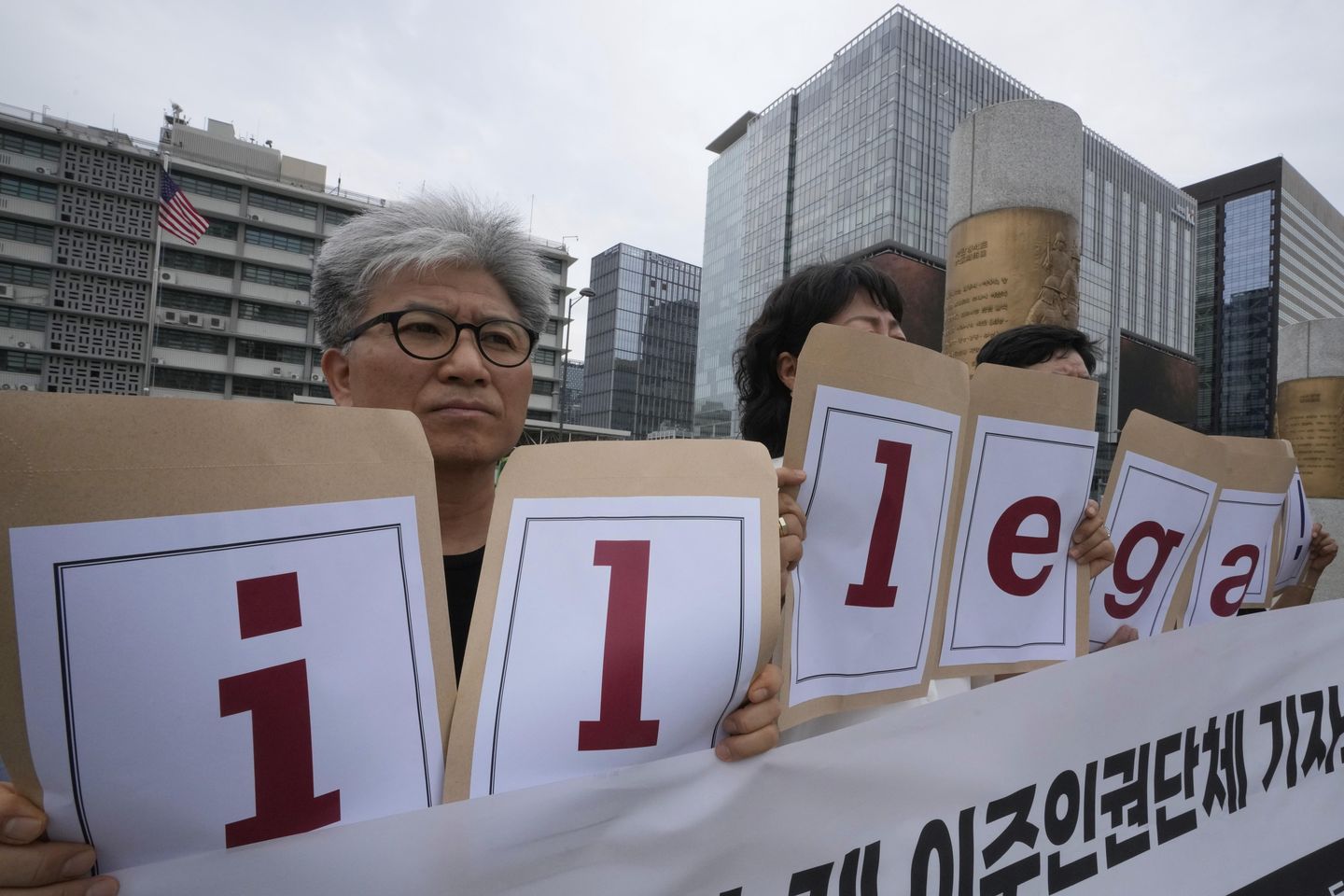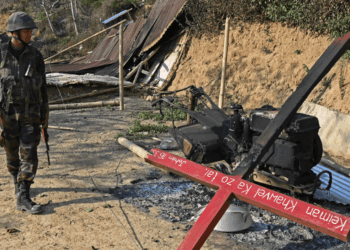
SEOUL, South Korea — A combination of public shock at the treatment of South Korean workers in a Georgia immigration raid, legal measures taken by former sex workers for U.S. troops in Korea and uneven U.S. tariffs on Korean and Japanese autos is generating concern about a possible resurrection of mass anti-Americanism.
Similar sentiments roiled Korea in 2002 and 2008, but animosity for the U.S. seemed to be at a lull in the years since. A resurgence could shake relations at a delicate time: The future of the bilateral security alliance is under negotiation.
An academic who advised previous Seoul administrations said fertile ground for anti-Americanism exists.
“South Korea has been going through structural victimization by the U.S.: [The U.S.] uses its purchasing power as leverage, and its security umbrella as bargaining power,” he said. “Strong anti-American sentiment is breathing in South Korea, but I don’t know when it will erupt.”
Events in Georgia last week, where Korean workers at a Hyundai-LG construction site were shackled and perp-walked by armed U.S. immigration agents, were a triple whammy.
Many Koreans see their country’s relationship with the U.S. as ironclad, but the actions of American authorities appeared unnecessarily harsh in reaction to the workers’ visa violations.
Moreover, the workers were engaged in precisely the kind of project U.S. President Trump seeks to reinvigorate U.S. manufacturing: establishing a Hyundai-LG battery plant for electric cars that will generate quality local jobs.
A Korean-American social media commentator likened the situation to U.S. immigration authorities and U.S. investment promoters “punching each other in the face.”
The 316 workers returned home via chartered flight Friday, but their unpleasant experience is not the only matter testing ties.
This week, 117 former Korean sex workers patronized by American soldiers stationed in South Korea charged in a lawsuit that they were trafficked by Korean pimps and treated brutally by their GI customers.
They seek apologies and compensation from Seoul and Washington.
Regardless of legal outcome, hearings look likely to cast harsh light on the shabby treatment the “camptown women” or “patriotic prostitutes” underwent. In order to earn dollars, they worked in tawdry “villes” that spread outside U.S. bases in Korea from the 1950s through the 1980s.
Separately, Washington has granted preferential tariffs to autos exported to the U.S. by Japan: While Japanese cars suffer 15%, Korean cars are subject to 25%. This represents an “emergency” for Korean automakers, the Korean press reports.
Korea is a direct competitor in vehicles, but is also a national competitor to Japan due to emotive historical issues.
A RealMeter poll found almost 60% of Koreans “disappointed” by U.S. actions.
A small demonstration of about 70 people has taken place outside the U.S. Embassy. Another protest, featuring an anti-Trump banner, greeted the construction workers arriving home Friday.
The timing of these tremors could hardly be worse.
President Lee Jae-myung held a successful summit with Mr. Trump in August. However, details on how a $350 billion investment package will work, and the future of the bilateral security alliance, remain to be worked out.
Damaging actions
Mr. Lee — a former leftist who has made clear his strong attachment to the Seoul–Washington relationship — has spoken up. At a press conference Thursday, he said Korean companies could be “hesitant” to invest in the U.S., and those there are “in a state of confusion.”
He is not alone in his criticism.
“The incident has severely undermined trust in South Korea’s efforts to contribute to the US economy through large-scale investments,” editorialized best-selling conservative daily The Chosun Ilbo. “Fundamental doubts emerge: What does the U.S. mean by ’alliance?’”
Lon Garwood, an American expatriate working for a Korean construction firm that flies in specialized teams around the world to establish plants, was scathing.
“The Korean workers weren’t there long-term or an immigration risk, they were there to do a specialized job, finish it, and return home,” he said. “Being shackled and held in a detention center for days was never part of their job description.”
U.S. bureaucracy must upgrade “visa issuance procedures — whether by securing a higher quota or creating a new category for short-term technical specialists,” he said. “Unless this is addressed, the U.S. risks undermining projects meant to create jobs and strengthen bilateral industrial ties.”
Foreign Minister Cho Hyun, in a meeting with U.S. senators, urged visa reform.
Critics have also taken aim at the Korean conglomerates that own the Georgia plant for not obtaining appropriate visas for the workforce.
Tami Overby, a partner at Washington consultancy DGA Group who formerly headed the American Chamber of Commerce in Korea, said ongoing developments “could potentially create a situation where anti-Americanism might erupt.”
“A lot depends on the action or inaction of the U.S. government,” added Chun In-bum, a retired general who champions the bilateral alliance. “I know the U.S. was following its laws, but if someone in authority said, “This was an unfortunate situation,’ or ’Sorry,’ that would go a long way to alleviate any future traction of anti-Americanism in Korea.”
“We must not take this lightly,” he warned.
Ms. Overby, who during her tenure at AMCHAM Korea suffered an office invasion and vandalism by student radicals in 2002, noted that Mr. Trump had attempted to calm roiled waters.
“I am heartened by the fact that President Trump seemed to recognize the Korean visa situation was a bit different than some other ICE raids,” she said. “He authorized that the Korean citizens could be transported without being handcuffed and shackled.”
Roots of anti-Americanism
Mass anti-Americanism has been dormant for 18 years.
Koreans know a withdrawal of U.S. troops would necessitate massively increased defense spending, and likely an extension of the unpopular draft.
Lesser known is the contribution of U.S. forces to South Korea’s global borrowing costs and inward investment: Their presence helps underwrite the country’s sovereign credit ratings.
Yet, there are multiple grounds for anti-U.S. feelings.
Such sentiment was dangerous in the 1940s and 1950s: Seoul massacred leftists both before and during the Korean War.
As Korea industrialized and enriched itself, Washington’s support for the authoritarian Seoul regimes of the 1970s and ’80s inflamed student demonstrators, with some student leaders later entering politics and government.
Post-democratization in 1987, suppressed information about U.S. killings of civilians during the Korean War emerged. In 2002, mass anti-Americanism exploded into the mainstream.
After two schoolgirls were killed in a road accident with a U.S. vehicle and the GIs involved were found not guilty by U.S. military judges, huge demonstrations erupted, flags were burned, and U.S. personnel were assaulted.
Fury was assuaged by the election victory of a leftist president — and an offer from the U.S. defense secretary to withdraw GIs from Korea.
In 2008, demonstrations surged anew after Korean TV reports alleged American farmers were exporting beef infected with “mad cow” disease. The protests subsided after reports were exposed as fake news.
Since then, hardcore leftists, unionists and peace activists have protested U.S. bases, but the mainstream has remained calm.
Could that change? Experts think not.
Korea’s security reliance on the U.S. cannot be ignored, said John Lee, editor at specialist media Korea Pro.
“China is much more powerful and influential than in the past,” he said. “Due to changing external circumstances, South Korea is going to try to see this through, through diplomacy.”
But America may suffer long-term costs.
“Korea is more developed, more prosperous, and demographically older,” said Daniel Pinkston, an international relations expert with Troy University. “Now, it is the U.S. that is doing things that come with reputational costs.”
That could include Korean tourists, students and investors ignoring the U.S. in favor of other destinations.
“These are not things you can see — no Molotovs at the U.S. Embassy,” Mr. Pinkston said. “But these are costs that are real.”













